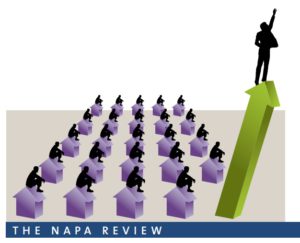The evidence is clear that employees today want more work-life balance. A Bain study found that 58% of workers across 10 global economies feel the pandemic has forced them to rethink the balance between their work and their personal lives.[1]
Employees are questioning why they work – what is it for? how can we do it better? The result is a “new era of humanity,” according to Korn Ferry. Among the ways organizations will reinvent themselves in response are to become more fluid with flatter, non-hierarchical structures and formalized hybrid models of working.[2] One report suggests that “human relations” will take the place of “human resources.”[3]
McKinsey has laid out 9 themes important to employees in the future workplace:[4]
Supporting employee perspectives about reimagining the workplace experience, a Gartner survey of 52 HR executives in 2020 found that companies were already moving ahead with changes:
- 94% of companies made significant investments in their well-being programs
- 85% increased support for mental health benefits
- 50% increased support for physical well-being
- 38% increased support for financial well-being[5]





